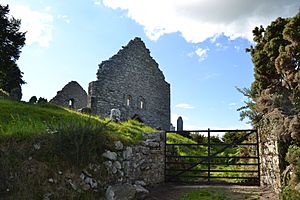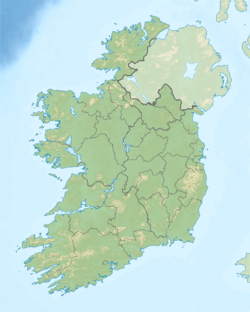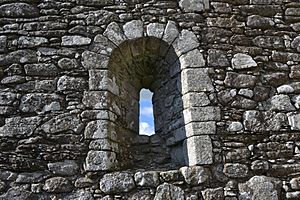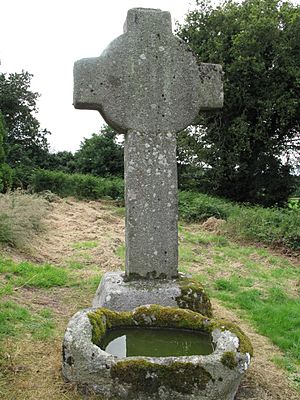Aghowle Church facts for kids
Quick facts for kids Aghowle Church |
|
|---|---|
|
Eaglais Achadh Abhall
|
|
 |
|
| 52°46′04″N 6°37′14″W / 52.767857°N 6.620430°W | |
| Location | Aghowle Lower, Coolkenno, County Wicklow |
| Country | Ireland |
| Denomination | Pre-Reformation Catholic; Church of Ireland |
| Architecture | |
| Style | Romanesque |
| Years built | 12th century |
| Specifications | |
| Length | 18 m (59 ft) |
| Width | 7.3 m (24 ft) |
| Materials | stone |
| Administration | |
| Diocese | Leighlin |
Aghowle Church is a very old church and a special national monument located in County Wicklow, Ireland. It was one of the biggest churches in the countryside during its time. Aghowle is also the name of a local area, or "civil parish," in the ancient region called Shillelagh.
Contents
Where is Aghowle Church?
Aghowle Church is found about 1.7 kilometers (just over a mile) southwest of a place called Coolkenno. It's close to some small streams that flow into the River Derreen.
The History of Aghowle
People believe that a monastery was started here by a saint named Finnian of Clonard way back in the 6th century. The monks lived in beehive huts around a wooden church. The name "Aghowle" comes from an Irish phrase meaning "field of apple trees."
The stone church you see today was built around the year 1100. It was used by the Church of Ireland until about 1716 or 1717. This church was the main religious site for the northern Ui Felmeda area. Its large size shows it was important, but exactly why it was so significant isn't fully clear from old records.
There's a local story about a "fugitive bell." It's said that Saint Finnian (who lived from 470 to 549 AD) put a bell tower at Aghowle. Later, he moved the bell to his other monastery at Clonard. But one day, the bell disappeared and reappeared back at Aghowle! Even after several tries to move it again, the bell always found its way back to Aghowle.
What the Church Looks Like
The church is a long, rectangular building with tall, pointed walls called gables. The original north, east, and west walls are still standing. The main entrance on the west side is made of granite. It has a flat stone (a lintel) on the outside and an arch on the inside. This doorway shows Romanesque designs and even older influences.
The east wall has two round-topped windows. These windows have special decorative moldings on the outside, supported by small pillars.
St Finden's Cross
To the northeast of the church, there's a tall high cross made of granite. It's about 2.8 meters (9 feet) high and might have been left unfinished. It stands on a pyramid-shaped base and is known as St Finden's Cross. The cross has carved panels on its main part and under its arms. Experts believe it was made around the 10th century.
The Baptismal Font
On the eastern side of the cross, you'll find a large baptismal font made of granite. It's about 130 cm (4 feet 3 inches) long and 73 cm (2 feet 5 inches) wide. People think it's even older than the Norman times in Ireland. Local stories say that water from this font could cure headaches.
Baptismal fonts became common in churches in Ireland during the 12th century. This happened as the church became more organized into parishes and dioceses. It meant that important ceremonies like baptisms had to take place inside a church. In the field to the southeast, there's also a large bullaun stone, which is a stone with a basin-like hollow.




